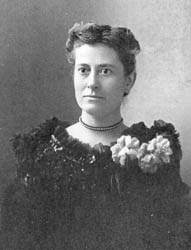
Williamina Fleming
1857 – 1911
Astronomer
Williamina Paton Stevens Fleming was a Scottish astronomer. During her career, she helped develop a common designation system for stars and catalogued thousands of stars and other astronomical phenomena. Fleming is especially noted for her discovery of the Horsehead Nebula in 1888.
Williamina was born at 86 Nethergate, Dundee. She married James Orr Fleming, an Accountant and widower in 1877. Williamina was a Teacher before travelling to Boston with her husband. After she and her child were deserted by James, she worked as a maid in the home of Professor Edward Charles Pickering. Pickering became frustrated with his male assistants at the Harvard College Observatory and, legend has it, famously declared his maid could do a better job.
In 1881, Pickering hired Fleming to do clerical work at the observatory. While there, she devised and helped implement a system of assigning stars a letter according to how much hydrogen could be observed in their spectra. Stars classified as A had the most hydrogen, B the next most, and so on.
Fleming contributed to the cataloguing of stars that would be published as the Henry Draper Catalogue. In nine years, she catalogued more than 10,000 stars. During her work, she discovered 59 gaseous nebulae, over 310 variable stars, and 10 novae. In 1907, she published a list of 222 variable stars she had discovered.
Fleming was placed in charge of dozens of women hired to do mathematical classifications and edited the observatory's publications. In 1899, Fleming was given the title of Curator of Astronomical Photographs. In 1906, she was made an honorary member of the Royal Astronomical Society of London. Soon after, she was appointed honorary fellow in astronomy of Wellesley College. Shortly before her death, the Astronomical Society of Mexico awarded her the Guadalupe Almendaro medal for her discovery of new stars. She published A Photographic Study of Variable Stars (1907) and Spectra and Photographic Magnitudes of Stars in Standard Regions (1911).
To make your own nomination download the nomination form here